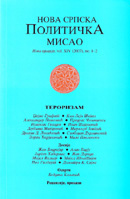| NSPM in English | |||
New Purge of Judges? |
 |
 |
 |
| петак, 05. децембар 2008. | |
|
“General reappointment” is every judge’s nightmare. The Serbian judiciary has undergone a number of purgatories for political reasons in the past two decades. First, all judges were subjected to the purge of “reappointment” in the parliament under the Act on Courts passed in the Milosevic era, on 30 July 1991. Many judges opposed the so-called local election fraud by courts in 1996. This led to a campaign to “restore order in the judiciary” in 1997, which resulted in the removal of sixty or so “unsuitable” judges. After the change in regime in 2000, most of these judges were reappointed. But, the new authorities had their own list of “unsuitable” judges. One such list included 187 names on 2 November 2001. There was talk of laying off as many as 700 judges. Although the judges firmly resisted the executive’s interference in the judiciary, around 200 judges were pressured into leaving. A kind of “silent vetting” of the judges was thus conducted. But the authorities still wanted to “clean” the judiciary. In June 2002, the Prime Minister and Minister of Justice held a meeting with the court presidents. They handed them a document saying: “Court presidents are asked to dismiss 50-100 judges each, at the initiative of the Minister of Justice of October 2001; deadline – 15 days”. The judges firmly rejected the task. The Government temporarily withdrew, but then made use of the State of Emergency (in 2003). The Act on Judges was amended to increase the influence of politicians in the procedures for dismissing judges and appointing court presidents. These amendments were condemned by the Council of Europe in its Report on Compliance with obligations and commitments and implementation of the post-accession co-operation programme. The Report notes “undue influence from the executive and legislative branches of power in the election/appointment of judges” and states that “(A)ction undertaken so far has rather weakened the position of judges and prosecutors in the legal system and was particularly detrimental to their independence”. Some of these shortcomings were rectified by a new set of judicial laws (adopted in 2004) and subsequently, by the new Constitution (passed in 2006). Under the Constitution, the Assembly can no longer dismiss a judge it has once appointed. Decisions on dismissals may be reached only by the High Judicial Council (Art. 148). The High Judicial Council is crucial for the “reappointment” which is now in the offing. This Council is to reappoint all the judges under the new draft law. What is the Judges’ Association worried about? The point is that the High Judicial Council is yet to be elected. Eight of the eleven Council members are elected by the Assembly (six from amongst the ranks of judges, one from amongst the ranks of lawyers and one from amongst the ranks of law professors), while three High Judicial Council members are members ex officio (Minister of Justice, Chairman of the Assembly Judiciary Committee and the President of the Supreme Court of Cassation). It is not difficult to imagine the following situation: the present MPs first appoint enough “suitable” judges and other High Judicial Council Members to ensure a majority for a specific political option. Then the majority in the High Judicial Council conducts a “reappointment” of Serbian judges, leaving only the “suitable” ones in court. All of this will be in accordance with the new law, but will actually constitute a major political purge of the judiciary. I am aware that the work of our judges is much criticised. But everyone urging a “general reappointment” of judges ought to think of what they would say if the “cleaning” of the judiciary were to be carried out by the opposing political option. Those who are glad that this law will give the “pro-European forces” an “iron broom” ought to think of what would happen if some other parties had the majority in parliament? I could bet my bottom dollar that there would be hue and cry about the “restoration of Milosevic’s authoritarianism” and the “destruction of judicial independence”. The only reasonable thing to do is abandon “general reappointment”. The new system ought to be given time to start working. Once the High Judicial Council is appointed, it ought to gradually remove the judges whose dereliction of duty has been established. Even a Council made up of mostly “politically correct” members, which would dismiss judges one by one, would do less damage than a most politically impartial Council, which must elect 2,500 judges as soon as possible. Instead of rash incisions and various “iron brooms”, the Serbian judiciary ought to be allowed to build its own mechanisms of self-control, like the other judicial systems in democratic systems have. That is the only way we can have a genuinely independent and honest judiciary. We can paste 100 “European” labels on an “iron broom”, but it will never become European. Because one does not enter complex institutions like the judiciary with barn tools. Whoever fails to understand that will remain a political “stable-boy” forever, no matter how often he or she claims commitment to “European values”. And we had thought Serbian politics had finally gotten rid of such people.
1. This article originally published in Politika on 6 November 2008, and translated by The Judges’ Association of Serbia (http://www.sudije.org.yu/?set_language=en&cl=en).[^] |
Остали чланци у рубрици
- Playing With Fire in Ukraine
- Kosovo as a res extra commercium and the alchemy of colonization
- The Balkans XX years after NATO aggression: the case of the Republic of Srpska – past, present and future
- Из архиве - Remarks Before the Foreign Affairs Committee of the European Parliament
- Dysfunction in the Balkans - Can the Post-Yugoslav Settlement Survive?
- Serbia’s latest would-be savior is a modernizer, a strongman - or both
- Why the Ukraine Crisis Is the West’s Fault
- The Ghosts of World War I Circle over Ukraine
- Nato's action plan in Ukraine is right out of Dr Strangelove
- Why Yanukovych Said No to Europe

.jpg)








 The Judges’ Association of Serbia sent a letter to the Assembly protesting against the new judiciary laws.
The Judges’ Association of Serbia sent a letter to the Assembly protesting against the new judiciary laws.











